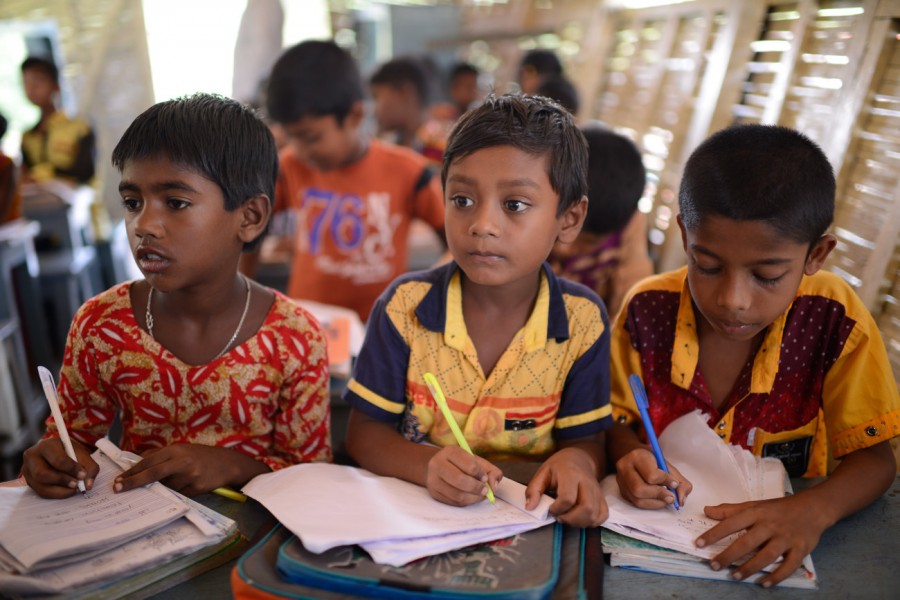Children left behind by Bangladeshi women migrant workers in underprivileged areas fail to go to schools regularly due to different factors including their engagement in economic and households activities, according to a study.
It showed that about 81 per cent of the children (males and females) left behind by women migrant workers get admitted into schools. Of them, 40 per cent girls and 48 per cent boys do not go to schools regularly.
Lack of motherly care causing loneliness and depression among the children left behind is another reason for not attending schools regularly.
Attitude and perception of local guardians also play a strong role in irregularity of children's attendance in schools.
Ovibashi Karmi Unnayan Programme (OKUP) conducted the study in 2019 with the support of Foundation Caritas Luxembourg (FCL) and Secours Catholique Caritas France under the project titled "Social and Economic Development of the Vulnerable Bangladeshi Migrants (SED)".
The study covered a total of 400 households of which 250 were migrant households and 150 non-migrant households in three unions of Faridpur district-Char Horirampur, Char Bhadrason and Gazirtek. Some 15,000 households are there in these areas.
The non-migrant households were surveyed to understand comparison between migrant and non-migrant households.
The study found that 80 per cent households have been able to increase their expenditure capacity on better housing, nutritious food intakes, access to healthcare and education of children with the earning of remittances sent by women migrant workers.
But the data shows 30 per cent of local guardians consider going to schools regularly is not as important as helping them in household activities.
The research found that 32 per cent children left behind are dropped out from schools before they are 16 years old.
Six focus group discussions (FGDs) with children (6-17 years old), two with local guardians while five in-depth interviews with stakeholders and guardians were also conducted as part of qualitative data.
This research is not representing the whole scenario of children, left behind by women migrant workers in Bangladesh. But it will help to understand social cost of women migration, said OKUP chairman Shakirul Islam.
It will also help government to take policy for the development of children, left behind by the women migrant workers through utilising remittances, he observed.
The findings showed that 70 per cent children left behind suffered from illness at least one time in the last 12 months while only 30 per cent children of non-migrant families experienced the same.
Lack of proper care of children left behind results in falling them into illness more frequently compared to non-migrant households.
But nearly 61 per cent of children left behind who became ill during the last 12 months were provided healthcare services compared to 39 per cent of children among non-migrant families.
Remittances increase households' ability to purchase healthcare but is not an automatic guarantee of increased access to healthcare of children left behind.
It often depends on caregiver's perception on priority factors of financing of remittances in the family. Data shows that less than 10 per cent of remittances are spent for healthcare of children left behind.
Some 20 per cent of remittance money is spent for food which is the largest amount of expenditure of remittances at household level of women migrant workers.
However, lack of knowledge about nutritious food among most of the caregivers, reluctance to change food habits due to extended and multi-generational family structure etc. have effects on taking non-nutritious food.
The non-migrant families had fewer opportunities to buy and eat nutritious food compared to migrant families.
Early marriage among the girl children left behind in the area is very common. Two important reasons for early marriage are better proposal of marriage when mothers stay abroad and relief from lack of security of girl children in general especially in absence of mother, the data said.
"It is needed to pay attention on human resource development in these char areas as migration has created opportunities to increase income level of people," OKUP chairman suggested.
As the remote areas it requires facilities like health and education; communication and protection are not available for children left behind of women migrant there, he mentioned.
He also stressed the need for creating awareness among the caregivers about the necessity of proper development of the children.
Representatives from civil society organisations and government officials, among others, were present at the programme held at a hotel in the capital.


